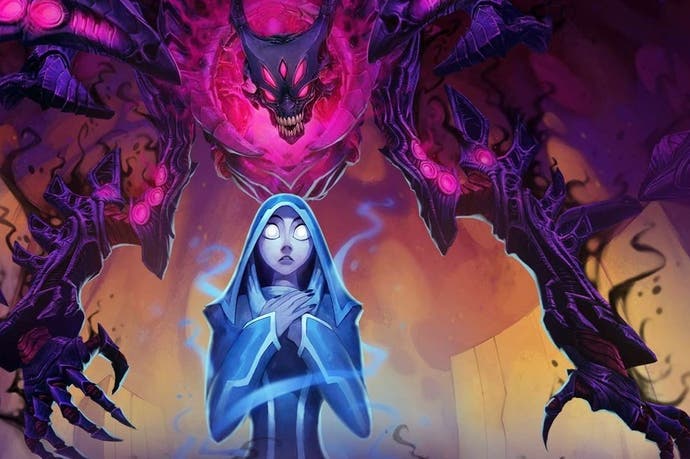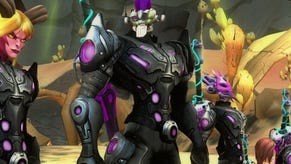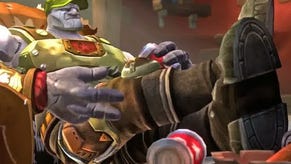Don't rule WildStar out yet
It's far from dead and buried, Carbine says.
The biggest bets in gaming are MMOs. They're games and persistent online services all in one, and they take longer, and cost more, than any other game to make. And then they're expected to grow and improve after launch. They're serious undertakings.
Take WildStar, the MMO released this summer from genre-specialist NCSoft: developer Carbine was formed nine years ago to create it. Years were spent building the tech foundations alone. Finally three game iterations later - including one about multiple dimensions - WildStar was released. 271 people were working on the game.
This wasn't a throwaway release; NCSoft must have poured many millions of dollars into the game. But when WildStar came out, well... you'd be forgiven for not noticing. Where were the headlines about success, about sales - or were they too low to talk about? Instead, WildStar found itself in headlines for having lots of bugs, for lay-offs at the studio and for Carbine cancelling traditional Halloween and Christmas game content amid more urgent concerns.
It didn't look good.
It was against this backdrop (and ahead of yesterday's huge bug fix and content patch) that I spoke with Carbine creative director Chad Moore, and product director Mike Donatelli, about the state of their game.

How many people play WildStar?
NCSoft is typically secretive about numbers, especially if there's little to shout about, but Mike Donatelli suggests they're way in excess - "many, many, many times" - 250,000.
"When we came out, my expectation was not, 'Oh we'll do a quarter-of-a-million people'... I didn't have a gigantic idea of what it would be," he says. "And then when we came out and we - and I'm not going to talk super-deep into numbers obviously - sold many, many, many times that amount, I was like, 'Holy crap!'
"And then the conversation - the talking - about the game just petered off."
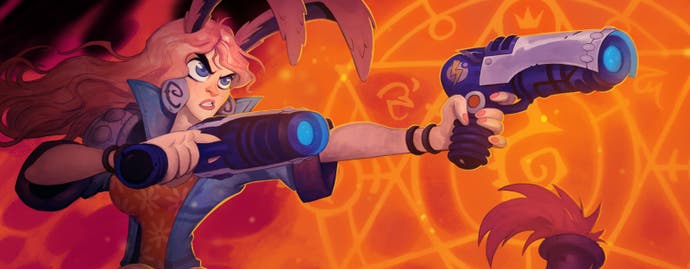
Is it a sinking ship?
Donatelli says he sat down with NCSoft West CEO a couple of weeks ago to talk about the future of WildStar.
"They specialise in MMOs, that's what they do. And they see a future for WildStar," he declares. "We have legs. And as far as NCSoft is concerned, they're going to support us, and I take them at their word for that when they've made a commitment to us for the future, so I feel very comfortable making that statement."

But what about those lay-offs?
At the end of October, NCSoft West announced lay-offs. Reports said Carbine was particularly affected, shedding as many as 60 staff. Those numbers were unconfirmed but Donatelli tells me now it's the "ball park" they were in.
"We can't obviously talk about particulars because it's corporate policy not to talk about that. But in and around about [60], that's the ball park. And that was some dev, some publishing - it was NCWest wide.
"We staffed up a lot before the game launched," he goes on. "At the peak, right before launch, we were 271, which is a gigantic team. It's gigantic. We had to hire up those folks to get the game solid for launch.
"In the studio I'm sitting at now, we still have hundreds of people working on WildStar. And that's the honest to God truth. As far as I was concerned it [laying people off] sucks, but it's part of game development."

But what about those negative company reviews on Glassdoor?
Glassdoor is a website where employees can leave anonymous feedback about their place of work. Carbine has an average rating of 2.3 stars out of five, and the most recent reviews aren't favourable for the company. They accuse Carbine of mismanagement and over-working staff.
"If you go to many Glassdoor reviews for many [games] companies, you're going to see a broad range, many of them negative," explains Chad Moore. "That's not to say people's opinions about that stuff aren't valid. With all of that, you just have to take those reviews with a grain of salt. We don't discredit anyone who has anything to say about our company.
"That being said, we still have - as Mike said - hundreds of employees that work here that would probably be very happy to say that they like the studio, they like the IP, they enjoy Carbine's working environment. You have to look at it in the broader picture of what's happening here at the studio."
Mike Donatelli adds: "It's interesting that Glassdoor only became a thing after we did the lay-offs. Look at the dates: half of those things came in after the lay-offs. And again: lay-offs suck. I hate it. We always try to support... when 38 Studios [developer of Kingdoms of Amalur] laid off their entire staff, we flew out there, interviewed everybody on the spot and hired 20-odd designers.
"We read every one of those of our own accord," he insists, "and we sat down and talked about... Even if they did leave and post this stuff, that could be the perception internally. And since that time we've had meetings to talk about it with the staff. We want this to be a place where people want to work. I want to want to work here."
Chad Moore continues: "That's a good thing to take away from all of this. This whole experience of launching an MMO, especially here at Carbine, has resulted in a lot of positive changes for our studio overall. I would consider us a much stronger studio than we were the day after we launched. Some of our processes for how we develop content, how we test content, are way better than they were just a few months ago."
Donatelli chimes in: "This was, at one point in time, a 70-person studio that ballooned up over a couple of years to try and get the game out the door. It's a learning experience. The team we were before the game launched is not the team we are today."
And Moore concludes: "Despite some of these difficulties that you're asking about, overall Carbine is a much stronger institution because of them."
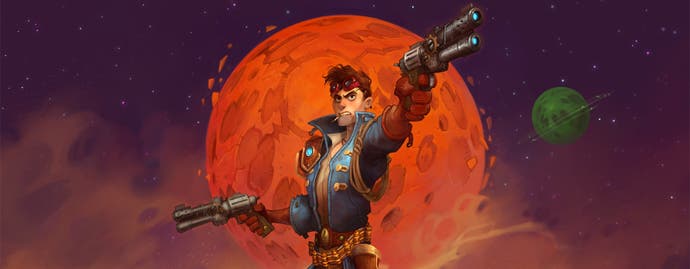
But what about merging servers?
When an MMO announces server-merges it's usually an admission of emptiness - people have left the game and those who remain are struggling to find people to play with. Carbine recently deployed mega-servers - clusters of servers working together to power one universe or world - for WildStar, but it's not the admission of mass-departure it seems.
"We talked about the mega-server tech probably six months before the game launched," says Donatelli. "It was an operations task; they needed code time, we needed coders to focus on the game. It was just one of those things we wanted to do but didn't get a chance to."
But.
"It would be false to say that [people leaving after the initial rush] didn't play into the idea of it. We had 31 servers when the game launched but we opened up another six or eight right at launch. And we fought about it when we sat there and talked about it, but the damn queue lines were so long and we were going to drive people away if we didn't open more servers. We opened more servers and now you're seeing that we need to go back to about the size we planned before the game launched.
"It's a mixture of both: we had the plan and we wanted to do it, but then we also realised that after that initial launch surge there were fewer people logging in at the same time so we needed to get something together. Instead of doing changes to the matchmaking, we actually changed the server structure."
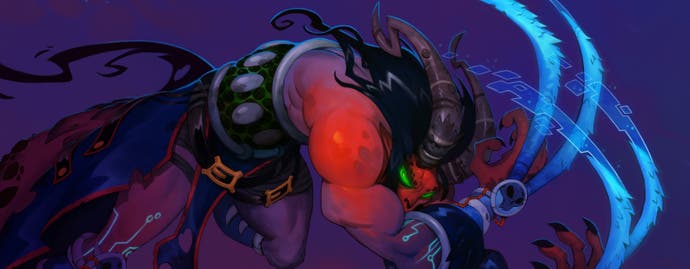
But what about future content?
Yesterday, a huge bug-fixing and content patch was rolled out in WildStar, named Mystery of the Genesis Prime. If the bug fixes were written on paper there would be 100 pages of...
"There's more than that now," Mike Donatelli interjects, "there's like 114!"
The Genesis Prime patch also contained big lumps of Journey into the Omnicore story content - content already supposed to be out but delayed by all the server changes, testing changes and development changes.
"Our hope with this is that it's a good reward for those people who've been waiting for that content," says Moore. "We're also hoping to replicate that structure. Instead of coming out with smaller chunks of content every month, we are more on a three-month cadence - what we have said as quarterly. That's the general time-frames we're looking at developing this chunk of content."
Will the next update three months from now be as significant?
"It is definitely significant," answers Donatelli. "I don't know if it will be as big as this one, because it is so many patches put together."
Moore says it will be "comparable" in terms of time you can spend exploring the story content, and that you'll know more "very soon".
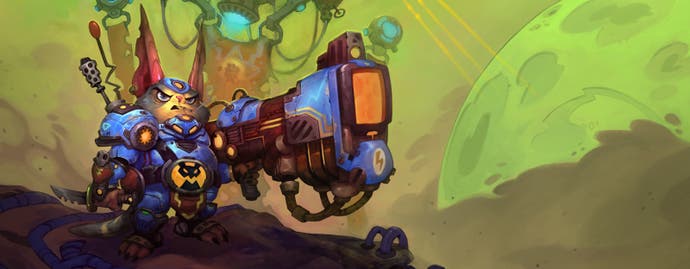
What are the big things that still need addressing?
Classes are being addressed, but by way of fixing the abilities that don't currently work first. It's hard to tell what is and isn't working until this happens, Donatelli tells me. "This Drop [update] with all the bug fixes is going to give people a lot of what they wanted," he believes. "We did plenty of changes but we had to focus on the bugs first."
Another big thing on the slate is solo and group content.
"One of the things, for sure, that players can look forward to is that we are putting a lot of effort and development time into content that can be experienced by both the solo players and as group players," says Moore. "There hasn't been as much for players that hit level 50 who aren't raiders - there haven't been other things for them to experience and enjoy at that level range and throughout the game.
"The content stuff that we're working on for our next quarterly update focuses a lot of our efforts on making sure solo players and smaller-group players have lots to do."
Rolled into that will be "a lot of changes to itemisation and how we reward the player" for playing that content, adds Donatelli.
WildStar may not have set the world alight when it launched earlier this year but let's not overlook what it did do: it offered an amount of content few other MMOs have managed at launch - crucially, high-end content to keep the power players playing. And the commitment at least for the foreseeable future to make a real go of WildStar is there.
